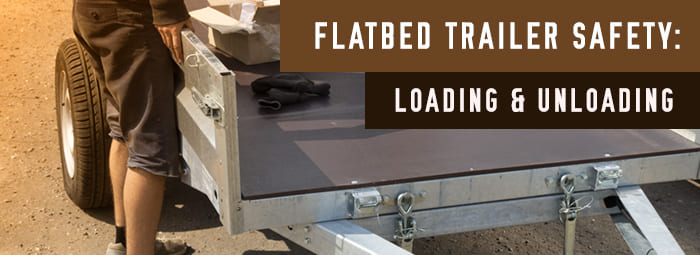Utility trailers are useful, coming in a variety of shapes and sizes to serve a number of purposes, and can offer some of the functionality of a roof rack’s weight bearing capability without putting any pressure or weight on the top of your vehicle. Whether you’re transporting landscaping tools, equipment, or small vehicles, knowing the weight of your utility trailer is a matter of safety. Here, we’ll show you how.
Know Your Numbers
Whether you’re hauling lumber or trying to determine your load capacity in tandem with that of an SUV, knowing the right numbers and what they mean is essential for both safety and success. You should know the weight of the trailer for safe driving, or registration purposes (like a boat trailer).
Usually, your trailer should have a VIN sticker somewhere on the frame or near the tongue that lists the maximum Gross Vehicle Weight Rating (GVWR) and the maximum capacity that it can support. The GVWR is the empty weight of the trailer plus the capacity that the trailer is rated for. Subtract the max capacity from the GVWR and you have the empty trailer weight.
If you want to know the exact weight of your utility trailer with its load, you have a couple of options for determining its exact weight.
The first option for determining your trailer’s weight is to know the weight of the utility trailer while empty and know how much weight you’re loading into the trailer. If you’re uncertain of your calculations and the weight of your load, the sure way to know is to weigh the trailer.
Weigh Your Utility Trailer on a Truck Scale
The simplest and fastest way to weigh a utility trailer is to take it to a truck scale. Locations capable of weighing trucks and utility trailers include but may not be limited to:
- Truck stops
- Weigh stations
- Junk yards
- Landfills
- Gravel yards
- Freight yards
- Grain elevators
- Grain and feed stores
- CAT scales
- RV lots
Make sure to call ahead and ask if you can come by to weigh your trailer, some places can be busy or don’t have space for an extra vehicle to stop by. If you don’t have a convenient location with truck scales to take your utility trailer to, you can weigh your trailer at home.
How to Weigh Your Trailer at Home
To weigh your utility trailer at home, you need either a tongue weight scale or a bathroom scale. The easiest way to weigh a trailer at home (without purchasing a large industrial vehicle scale) is with a trailer tongue weight scale, such as this one from Sherline.
Trailer tongue weight should be between 10-15 percent of gross trailer weight (GTW). For example, a 1000 lb trailer should have a tongue weight between 100 lbs and 150 lbs. Average trailer tongue weight scale prices range from about $150-$350, depending on the scale and the seller.
If you can’t get a hold of a trailer tongue weight scale, you can measure it with a bathroom scale.
How to Weigh A Utility Trailer with A Bathroom Scale
Step 1: Level Out the Trailer
Being level is important when getting an accurate weight. Make sure that the wheels are chocked so the trailer can’t roll.
Step 2: Prepare the Ground
Take a reliable board, like a 2x4, and place it directly below the trailer’s tongue. The board needs to be at least 3.5 feet long for this to work.
Place the bathroom scale roughly 2 feet in either direction from the trailer tongue, and a block or brick about 1 foot from the trailer tongue the opposite end from the scale. You’ll want to protect the bathroom scale with a small piece of plywood or other material on the top.
Insert two horizontal pipes between the 2×4 and scale/brick: one in the center of the bathroom scale and one in the center of the brick.
Step 3: Weigh it on the Scale
Lower the trailer jack until the coupler is fully resting on a vertically-positioned pipe. Read the scale and multiply by 3. The average bathroom scale can’t do the entire weight, hence the multiplier.
Why Utility Trailer Weight Matters
The weight in your trailer can affect the overall health of your axles, frame, and suspension. If you improperly load or overload your fill your utility trailer, you could be putting your truck, your trailer, and others at risk. Overloaded and improperly loaded vehicles are more prone to rollover accidents.
Average Utility Trailer Weights
The weight capacity of a small utility trailer can also range significantly. A short, aluminum utility trailer may only have a GVWR of 1,000 lbs, while a wide, double-axle, steel utility trailer may be rated for 3,000 lbs.
According to Curt, open utility trailers less than 10 feet long typically weigh about 700 lbs unloaded, but they can vary greatly – from 300 lbs to 1,100 lbs – depending on the construction, width, features, number of axles, and more.
Camera Source for A Safer Road
In addition to knowing your weights and measures, using a quality backup camera is a great way to increase your safety on the road. A backup camera can help you navigate with confidence while reversing, hitching, or parking your utility trailer and truck. When you’re looking for backup cameras for a safer road, Camera Source is your best stop for backup cameras.
Checkout our inventory of high quality backup cameras to keep your truck, trailer, and more safe. Camera Source offers a huge selection of high quality automotive cameras and accessories (reverse, heavy duty, front and side, bluetooth, and more!) for all the popular manufacturers:
If you can’t find a camera that’s designed for your specific vehicle, that’s not the end of the road. We have universal cameras that will work well on many vehicles. Get in touch with us today, or start shopping now.









